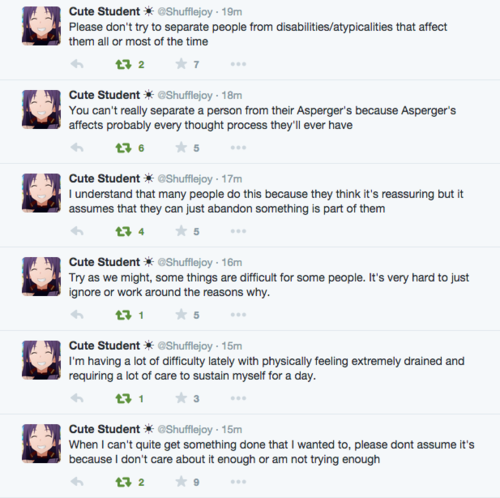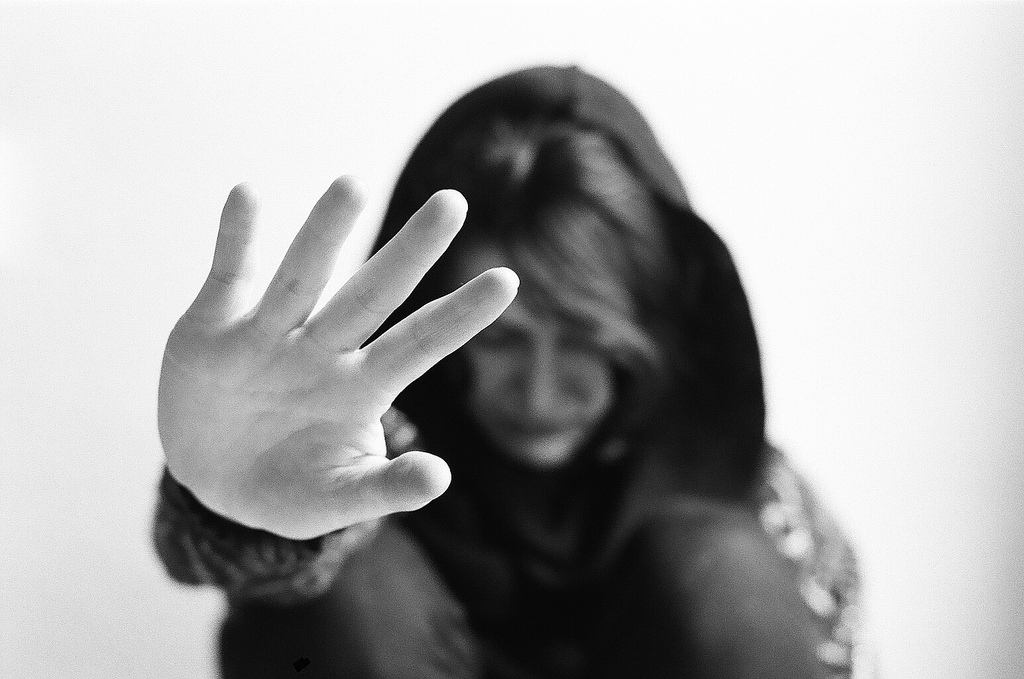By Rabbit KM for Queer Cripple, cross-posted with permission
Hi, able[-bodied] people!
Today on Twitter, I saw a series of tweets by @shufflejoy that I wish all abled people would read and think about:

It’s important. People, particularly abled people, try to separate disabled people from our disabilities a lot. For example, if you tell me (like many abled people have) “You’re not your autism!, ”“You’re not autistic, you’re a person!” or “Don’t think of yourself as disabled” you’re separating me from my disabilities. The same is true of “I don’t really think of you as disabled,” “Don’t let your disabilities become your identity,” “You’re a person with autism, not an autistic person,” and “Your disabilities don’t define you!”
I can’t speak for all disabled people, but I can tell you how this affects me, and I can tell you that I’m not alone. (Look at some of the replies to the tweets I linked to, for a start).
When you say those things, you probably mean well. I know that. You probably think you’re being kind. Maybe you think you’re being encouraging. To put it bluntly, you’re not.

As Shufflejoy pointed out, disabilities that affect us every day aren’t things we can just abandon or separate from ourselves. I’m not completely defined by my autism, ADHD, and physical disabilities, but all of those things affect my experiences every day of my life. They’re part of what defines me as a person. They’re part of my identity.
When I was in recovery for anorexia/bulimia, one of the therapists would often say “Your life is defined as the majority of your thoughts.” And you know what? I think about my disabilities almost constantly. I’m not complaining — I’m pretty comfortable with that, although I do wish I lived in a more accessible world, which would make it a bit less necessary.
I think about whether I have enough time and energy to do what I want without getting sick for days (see The Spoon Theory by Christine Miserandino). I think about how I physically feel. I think about what activities will be practical and safe for me today, and how to prioritize them. I think about my autism — about the metaphors and phrases I don’t understand, the textures that make my teeth hurt, the textures that sooth and enthrall me, the way the sound of suddenly ringing bells or shouting makes my spine tense painfully, the wonderful repetitions and rhythms around me and in my mind – countless things that define how I feel and experience.
I can’t ignore that. I don’t want to ignore that. When you treat my disabilities as something separate from me that doesn’t define me, you deny the power and overwhelming significance of those experiences in my life.
I think Shufflejoy is right that for many people, it’s a reassuring way to think. It lets you pretend disability isn’t significant. For able[-bodied] people, it means that you don’t have to think about it. For disabled people, it’s often not practicable long term. I used to try. I tried to make my disabilities an afterthought, and it didn’t work. I ended up trying to do more than I could and getting very, very sick. I used my eating disorder to relieve the anxiety from constantly trying to hide my autistic traits. I made promises I couldn’t keep, because however much I try to ignore them, my disabilities really do limit me.
And when people dismiss that, they often end up blaming me for my limitations, saying I’m “letting disability define me.” No. I’m surviving. I’m living. It’s not my fault that I have physical limitations. It’s not my fault that my brain works very differently from most people’s brains (and I like my brain, thank you very much). No amount of willpower or ~*~*~believing~*~*~ is going to change that.
Identifying as disabled and autistic is a way that I take ownership of who I am. I’m not insulting myself, because “disabled” and “autistic” aren’t insults. I’m not letting it define me – it defines me either way. I’m owning it.
When I say “I am disabled,” that isn’t self-pity. I’m not giving up, showing low confidence, or calling myself weak. I’m strong, worthy, powerful, and disabled. I’m loving, compassionate, determined, and autistic. These aren’t contradictions: I’m stating and owning who I am. After a lifetime of being told my disabilities are weaknesses, I’m being strong without denying them. This is empowerment.
I’ve talked to countless disabled people who feel the same way – not all of us, but many. By saying “We are disabled,” we’re claiming ourselves, our bodies, our brains, and our needs.
So don’t fucking tell us not to.
Cheers,
Rabbit KM
One thought on “Please Stop Saying “Don’t Let Your Disabilities Define You!”: An Open Letter to Almost Everyone”